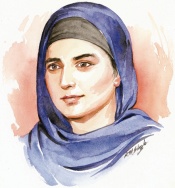Template:AOW5: Difference between revisions
Hari singh (talk | contribs) mNo edit summary |
Hari singh (talk | contribs) mNo edit summary |
||
| Line 1: | Line 1: | ||
[[Image:Sikh | [[Image:Sikh lady.jpg|thumb|175px|left|Water painting of a Sikh Women in Dastar (Turban)]] | ||
'''[[Sikh Women|WOMEN IN SIKHISM:]]''' In [[Sikhism]], the [[Sikh]] | '''[[Sikh Women|WOMEN IN SIKHISM:]]''' In [[Sikhism]], the [[Holy Scriptures]] have clearly stated that the [[Sikh]] woman has always been regarded as an equal with man and has all the rights and privileges enjoyed by a man. She is considered to have the same soul as man and has equal right to grow spiritually. The Sikh woman is allowed to lead religious congregations, to take part in [[Akhand Path]] (the continuous recitation of the Holy Scriptures), to perform [[Kirtan]], to work as [[Granthi]] (priest) or a preacher and to participate freely in all religious, cultural, social, political and secular activities. | ||
[[Sikh]] woman have played a glorious part in Sikh History and have proven themselves as equal in service, devotion, sacrifice and bravery. Examples of their moral dignity, service and self sacrifice are and will remain a source of inspiration. Women are the backbone of the history of the Sikhs, their culture and tradition yet there is little written about this huge contribution by the Sikh women to the great history of this religion. '''[[Sikh Women| Continued.....]] | |||
Revision as of 04:29, 3 June 2006
WOMEN IN SIKHISM: In Sikhism, the Holy Scriptures have clearly stated that the Sikh woman has always been regarded as an equal with man and has all the rights and privileges enjoyed by a man. She is considered to have the same soul as man and has equal right to grow spiritually. The Sikh woman is allowed to lead religious congregations, to take part in Akhand Path (the continuous recitation of the Holy Scriptures), to perform Kirtan, to work as Granthi (priest) or a preacher and to participate freely in all religious, cultural, social, political and secular activities.
Sikh woman have played a glorious part in Sikh History and have proven themselves as equal in service, devotion, sacrifice and bravery. Examples of their moral dignity, service and self sacrifice are and will remain a source of inspiration. Women are the backbone of the history of the Sikhs, their culture and tradition yet there is little written about this huge contribution by the Sikh women to the great history of this religion. Continued.....

